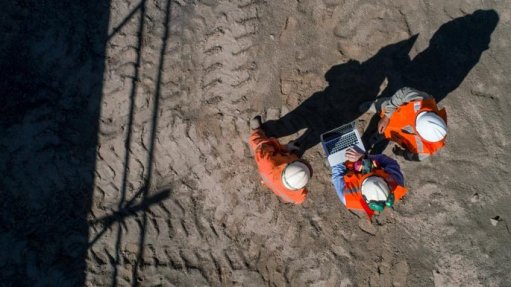Wescoal commits to black holding company control to qualify for Eskom business

Coal mining and trading company Wescoal said, at its presentation of results attended by Mining Weekly Online’s Martin Creamer, that it was taking steps to be more than 50% black owned by December 2016 in order to obtain long-term contractual business from Eskom. Photographs: Duane Daws. Video: Nicholas Boyd. Video Editing: Lionel da Silva.
Coal mining and trading company Wescoal, which suffered lower profitability in the three months to March 31 on the drying up of long-term Eskom contracts, has committed to becoming more than 50% owned by black shareholders before December 2016 to qualify for long-term coal business from the State power utility, which its resources suit.
The JSE-listed company reported fallen mining sales and production in the 12 months to March 31, when higher revenue, buoyed by the trading business, failed to lift profitability, owing to the absence of long-term Eskom business.
“We were particularly hard hit by low Eskom sales in the fourth quarter,” acting CEO Waheed Sulaiman said at the results presentation attended by Creamer Media’s Mining Weekly.
The lack of an appropriate black majority structure, in turn, resulted in the company’s long-term funding package not being concluded, the company reiterated in a Stock Exchange News Service announcement.
Wescoal Trading remained the group’s strong performer in the non-Eskom domestic coal sales market, with trading revenues much higher at R1.1-billion, compared with R591.2-million in the company’s 2014 financial year, but its margins of profit thinner than mining margins.
CFO Morné du Plessis reported a significant increase in costs, greater provision for bad debts after a default by a significant customer and fallen cash reserves.
Short-term Eskom contracts were proving suboptimal for the company, with ‘stop and start’ complicating operational performance.
“We’ve been under pressure from that and we’ve lost sales and profitability,” Du Plessis reported.
Yearly production of 1.5-million tons was 6% down at the underperforming Khanyisa coal mine, with the new Intibane’s lower strip ratio coming to the rescue to improve the margin from 11% to 13% and Wescoal running on at breakeven.
The company hopes to bring the new Elandspruit colliery into operation in the next few months with an overall company production of four-million tons of coal a year by 2016.
Sulaiman said the company had begun a process to become majority black-controlled at holding company level and expected to be awarded Eskom long-term contracts on the basis of its commitment to achieve a 50%-plus-one-share ownership by historically disadvantaged South Africans by December 2016.
“We will empower the company that is listed on the JSE,” he affirmed during question time.
The first phase of the process towards black control had been completed by assigned consulting company PwC, which would be submitting its report to the board for response.
“We have to sell to Eskom. Our resources are Eskom-type resources. So it’s not as if we decide we want to export these resources or sell them to another customer.
“This is why we keep harping on [its] being so crucial for us as a business to address Eskom’s needs,” Sulaiman pointed out.
During discussions with Eskom, three months or so had been lost and, in the interim, the company was engaging in short-term contracts.
“But Eskom is starting to show a lot of goodwill and pushing the process as much as they can,” he added.
Mining revenues in the 12 months to March 31 were R557.3-million, compared with R556.2-million, with operational earnings before interest, taxes, depreciation and amortisation (Ebitda) of R94.7-million, which was down on last year’s R101.2-million, the company said in a media release.
Trading revenues were much higher at R1.16-billion, compared with R591.2-million last year, with operational Ebitda improving considerably to R34.3-million from R1.6-million in the prior period.
Sulaiman stepped up from his role as Wescoal executive director: commercial and strategy to lead the group when incumbent Andre Boje resigned after a board dispute earlier this year.
Prior to his Wescoal appointment, Sulaiman, a chemical engineer, worked in various roles at BHP Billiton’s South African operations, including helping to develop a black economic-empowerment strategic framework, the company said in a media release.
Comments
Press Office
Announcements
What's On
Subscribe to improve your user experience...
Option 1 (equivalent of R125 a month):
Receive a weekly copy of Creamer Media's Engineering News & Mining Weekly magazine
(print copy for those in South Africa and e-magazine for those outside of South Africa)
Receive daily email newsletters
Access to full search results
Access archive of magazine back copies
Access to Projects in Progress
Access to ONE Research Report of your choice in PDF format
Option 2 (equivalent of R375 a month):
All benefits from Option 1
PLUS
Access to Creamer Media's Research Channel Africa for ALL Research Reports, in PDF format, on various industrial and mining sectors
including Electricity; Water; Energy Transition; Hydrogen; Roads, Rail and Ports; Coal; Gold; Platinum; Battery Metals; etc.
Already a subscriber?
Forgotten your password?
Receive weekly copy of Creamer Media's Engineering News & Mining Weekly magazine (print copy for those in South Africa and e-magazine for those outside of South Africa)
➕
Recieve daily email newsletters
➕
Access to full search results
➕
Access archive of magazine back copies
➕
Access to Projects in Progress
➕
Access to ONE Research Report of your choice in PDF format
RESEARCH CHANNEL AFRICA
R4500 (equivalent of R375 a month)
SUBSCRIBEAll benefits from Option 1
➕
Access to Creamer Media's Research Channel Africa for ALL Research Reports on various industrial and mining sectors, in PDF format, including on:
Electricity
➕
Water
➕
Energy Transition
➕
Hydrogen
➕
Roads, Rail and Ports
➕
Coal
➕
Gold
➕
Platinum
➕
Battery Metals
➕
etc.
Receive all benefits from Option 1 or Option 2 delivered to numerous people at your company
➕
Multiple User names and Passwords for simultaneous log-ins
➕
Intranet integration access to all in your organisation


















